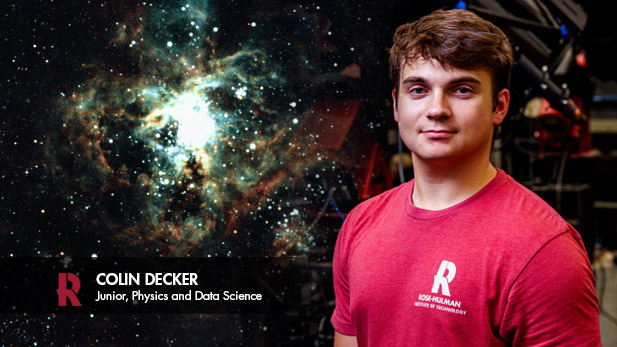Astronomy Research Opens the Universe, Scientific Opportunities for Colin Decker

Physics student Colin Decker has used images collected from Rose-Hulman’s Oakley Southern Sky Observatory in the Australian outback to examine the existence of possible exoplanets and explore other wonders of the universe.
The evening skies will once again be filled this fall with stars and planets that can be easily seen by the human eye, with the assistance of binoculars, or, better yet, through simple table-stand telescopes.
But if you look much closer, there’s a whole new universe of astronomical wonder to be explored within our Milky Way galaxy – and beyond.
That’s what Rose-Hulman physics student Colin Decker is striving to uncover through the college’s Oakley Southern Sky Observatory, nestled in the Australian outback.
He’s using images collected from the observatory’s high-powered telescope to measure light curves streaming from drops in starlight caused by passing planets, called transiting exoplanets. These transit observations reveal the sizes of planets as well as their orbital periods. Exoplanets are very hard to see directly as they are hidden by the bright glare of the stars they orbit.
Decker is among a small community of amateur stargazers who are searching for scientific support about possible exoplanet candidates. That knowledge is then provided for possible confirmation by professional astronomers and astronomical researchers at observatories with some of the world’s largest telescopes.
“I’m taking images every 25 seconds and then closely examining hundreds of images in hopes of identifying traces of a possible exoplanet within the vast array of the universe, with many being more than 1,000 light years away,” he says. “Some nights less than 10 images might reveal something interesting, while other nights there might not be anything. There can be several false positives in the images collected. It’s like fishing and hoping to catch something in a very large body of water. Like with any research, it takes a lot of patience.”
The first transiting exoplanet was detected in the early 1990s; more than 5,000 are now known, according to reports; and almost 9,000 await further confirmation by Decker and other stargazers.
Information about 20 possible exoplanets was collected by Decker this summer and more could be added as the project continues this fall and winter, under the mentorship of Oakley Observatory Director Elizabeth Melton, PhD, assistant professor of physics and optical engineering.
“In a small way, I’m contributing to something that could be very big in the future. It feels good and rewarding to be contributing to something new,” remarks Decker. He and Melton may submit their research findings for future consideration by national astronomy journals and scholarly publications.
The opportunity to explore the universe at one of the nation’s finest observatories and leading-edge physics and optical engineering programs attracted Decker to attend Rose-Hulman from Pickerington, Ohio. The college is blessed to have two observatories filled with state-of-the-art technology. The Oakley Southern Sky Observatory in New South Wales, Australia, was chosen for its clear, dark skies and location in the southern hemisphere. Meanwhile, the Oakley Observatory, located on the east side of campus, features a variety of telescopes and other equipment necessary for the study of the night sky by students throughout each academic year.
Together, both observatories provide students and faculty nearly 24-hour access to astronomical events in the northern and southern hemispheres. This has allowed students to identify new asteroids, measure asteroid rotation periods, and, like Decker, conduct research in photometry while searching for such objects as supernovae, comets, and exoplanets.
“This has been the best place for me to learn. Where else could I have had access to such amazing opportunities, such two outstanding observatories? I couldn’t have made a better choice,” states Decker, who was introduced to astronomy in a Physics of Stars course during his first year. He then took introductory- and advanced-level Observational Astronomy courses, taught by Melton, during the 2022-23 school year.
“Colin has a keen interest in astronomy and approached me about ways he could explore research possibilities, seeing if graduate school or doctorate-level studies could be in the future. This is the time for him to explore those interests,” says Melton, who earned bachelor’s degrees in physics and mathematics, with a minor in astronomy, from Rose-Hulman. She went on to add a PhD in astronomy from Penn State University.
For his own journey, Decker is contemplating accentuating his physics interests by adding data science as a second major, along with a minor in astronomy. Those interests and the possibility of having published research papers could enhance his plans to attend graduate school, studying physics or astronomy.
“Physics is the underlying purpose of everything that happens around us,” said the third-year student. “Astronomy is just one piece of those elements. I’ve always been interested in astronomy and this current research is just the starting point in my search to better understand the universe.”
With many extracurricular opportunities available at Rose-Hulman, Decker is able to continue his interests in the performing arts by playing trumpet in the college’s jazz band. He is a member of the Pi Kappa Alpha fraternity and astronomy and disc golf clubs.
“Really, the sky’s the limit on what you want to do at Rose-Hulman,” he said. “There were five students in my Advanced Observational Astronomy class last spring, with eight telescopes in the observatory. We could set things up and explore the skies nearly every night. It was great.”